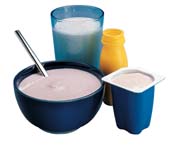
What should formulators consider when choosing a probiotic?
"Microbiologists agree that it cannot be assumed that research published on one strain of a probiotic applies to another strain, even of the same species," says Mary Ellen Sanders, a consultant with Centennial, Colo.-based Dairy and Food Culture Technologies and president of the International Scientific Association of Probiotics and Prebiotics (ISAPP). "Therefore, documentation of type of bacteria (genus and species), potency (number of viable bacteria per dose), purity (presence of contaminating or ineffective bacteria) and the extent of research that has been published on health effects must be provided for any strain being used in a product. Usually the culture supplier can provide this information."
According to Sanders, there have been hundreds of papers published on the health benefits associated with probiotic cultures, which is one reason why the future is so promising for probiotic-containing dairy foods.
For the most part, anyone conducting a clinical study on probiotics in the past 10 years focused on a defined strain or a defined blend of strains. Clinical studies have focused on showing that the specific strain(s) survives in the carrier food until the time of consumption in levels that ensure sufficient viable organisms are transported to the site in the body where they do the most good. While most strains have been studied for the sole purpose of confirming that the strain possesses the general probiotic health benefit of maintaining natural balance in the gastrointestinal system, others strains have been studied for additional specific benefits.
Some companies maintain exclusive rights to specific strains, while other strains are available to food and beverage manufacturers. For example, Japan's Yakult is the only dairy product from which one can consume Lactobacillus casei Shirota. Nestlé S.A., Switzerland, has similar restricted use with Lactobacillus johnsonii La1, which is delivered to consumers via Nestlé's LC1 yogurt line.
One of the most highly researched probiotic cultures is the Lactobacillus rhamnosus GG (LGG) strain. Valio Ltd., Finland, owns the worldwide rights to LGG, and uses the culture in its Gefilus® line of dairy products. Other manufacturers around the world currently license the use of LGG from Valio. What makes LGG so attractive, and has set a precedent for other probiotic strains, is the large
body of scientific research supporting the benefits of LGG. This strain has been shown to specifically help prevent and treat diarrhea, as well as prevent a recurring food-associated allergic condition called atopic eczema in infants. Such documentation enables companies that formulate with LGG to make health claims in their marketing materials and thereby distinguish themselves from their competitors.
Stonyfield Farm, Londonderry, N.H., licenses the use of Lactobacillus reuteri from BioGaia AB, Sweden. L. reuteri is the only Lactobacillus species to produce and secrete reuterin, an anti-microbial agent that prevents the growth of pathogenic microorganisms in the gastrointestinal tract while not affecting other bacteria that are normal to a healthy person. It, too, is a well documented microorganism.
Also from Sweden comes Lactobacillus paracasei F19. Isolated and researched by Arla Foods, F19 is used by Arla in its own dairy products, but is also available to other manufacturers through the company's Medipharm subsidiary.
Danisco A/S, Denmark, offers two ranges of branded probiotic cultures: Howaru™ and FloraFIT™. Howaru consists of two highly documented probiotics called Howaru Bifido (Bifidobacterium lactis DR10) and Howaru Rhamnosus (Lactobacillus rhamnosus DR20).Currently Danisco has exclusive Howaru marketing arrangements with dairy accounts in South Africa, Chile and Slovenia.
FloraFIT consists of a broad range of probiotic cultures, including five Bifidobacterium and eight Lactobacillus. Most are available to manufacturers on a non-exclusive basis with the one exception being Lactobacillus acidophilus NCFM, the most highly documented strain of L. acidophilus in the world. In addition, the genome of this strain has been completely sequenced, which should enable targeted strain design for future applications. In certain markets, Danisco has extended exclusive marketing rights to this unique strain.
Chr. Hansen A/S, Denmark, markets the nu-trish® series of probiotics, which is divided into three groups. In the Probio-Tec™ group, each product contains at least one single strain with well-documented benefits. For example, LA5 and BB-12™ are single-strain L. acidophilus and Bifidobacterium strains, respectively, and are specifically identified in products such as Ocean Spray® Plus Probiotic Yogurt Drink.
The Yo-Fast® series offers probiotic culture blends with acclaimed generic health benefits. The third group consists of single-strain probiotic with generic health benefits.
From The Netherlands, DSM offers the Delvo-Pro® range, which contains exclusively selected LAFTI® strains. The company describes these cultures as second-generation probiotics, as they have been isolated and recognized for their strain-related characteristics. For example, LAFTI L10 is a proprietary strain of L. acidophilus and LAFTI B94 is a proprietary Bifidobacterium lactis.
In the United States, it is necessary to have such scientific substantiation if a structure/function claim regarding the effect of probiotics on the normal functioning of the human body is going to be made on a food or beverage. This documentation is also recommended for claims or suggestions made on supporting marketing materials. The responsibility for accuracy lies with the food or beverage manufacturer, which is why it is so important to work closely with the culture supplier.